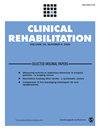Rasch Analysis of the Chinese Version of the Nociception Coma Scale–Revised in Patients with Prolonged Disorders of Consciousness
IF 2.6
3区 医学
Q1 REHABILITATION
引用次数: 0
Abstract
ObjectivesThe aim of this study was to analyze the Chinese version of the Nociception Coma Scale–Revised in patients with prolonged disorders of consciousness within the framework of Rasch modeling, including investigating the invariance of total scores across different etiologies of disorders of consciousness.DesignProspective psychometric study.ParticipantsPatients with prolonged disorders of consciousness from the Rehabilitation and Neurology units in hospital.InterventionsNone.Main Outcome MeasureThe Nociception Coma Scale–Revised was undertaken by trained raters and the Coma Recovery Scale-Revised was used to assess patients’ consciousness. The psychometric properties within the Rasch model including item-person targeting, reliability and separation, item fit, unidimensionality, and differential item functioning were assessed.Results84 patients with prolonged disorders of consciousness (mean age 53 years; mean injury 5 months; 42 with Minimally Conscious State and 42 with Unresponsive Wakefulness Syndrome) of 252 observations were enrolled in the study. Through the procedure of repeated assessment and differential item function, a lower item bias Rasch set was purified. The Rasch model assumptions were examined and met, with item reliability and validity meeting the recommended threshold.ConclusionsThe Chinese version of the Nociception Coma Scale–Revised demonstrated unidimensionality, good reliability and separation, and good item fit, but dissatisfied person fit and item-person targeting. The verbal subscale showed a notable discrepancy between person responses and the difficulty of the items, suggesting limited clinical significance.对长时间意识障碍患者的中文版痛觉昏迷量表(修订版)进行拉施分析
目的在Rasch模型的框架内分析中文版《痛觉昏迷量表(修订版)》在长期意识障碍患者中的应用情况,包括研究总分在不同病因引起的意识障碍中的不变性。干预措施无。主要结果测量由训练有素的评分员对患者进行痛觉昏迷量表(Nociception Coma Scale-Revised)评分,并使用昏迷恢复量表(Coma Recovery Scale-Revised)对患者的意识进行评估。评估了 Rasch 模型中的心理计量特性,包括项目-人目标、可靠性和分离度、项目拟合、单维性和差异项目功能。通过重复评估和差异项目功能的程序,纯化了一个项目偏差较低的 Rasch 集。结论中文版痛觉昏迷量表(修订版)具有单维性、良好的信度和分离度、良好的项目拟合度,但人的拟合度和项目-人的目标性不理想。言语分量表显示出人的反应与项目难度之间存在明显差异,这表明其临床意义有限。
本文章由计算机程序翻译,如有差异,请以英文原文为准。
求助全文
约1分钟内获得全文
求助全文
来源期刊

Clinical Rehabilitation
医学-康复医学
CiteScore
5.60
自引率
6.70%
发文量
117
审稿时长
4-8 weeks
期刊介绍:
Clinical Rehabilitation covering the whole field of disability and rehabilitation, this peer-reviewed journal publishes research and discussion articles and acts as a forum for the international dissemination and exchange of information amongst the large number of professionals involved in rehabilitation. This journal is a member of the Committee on Publication Ethics (COPE)
 求助内容:
求助内容: 应助结果提醒方式:
应助结果提醒方式:


